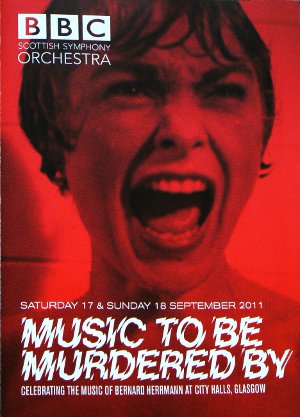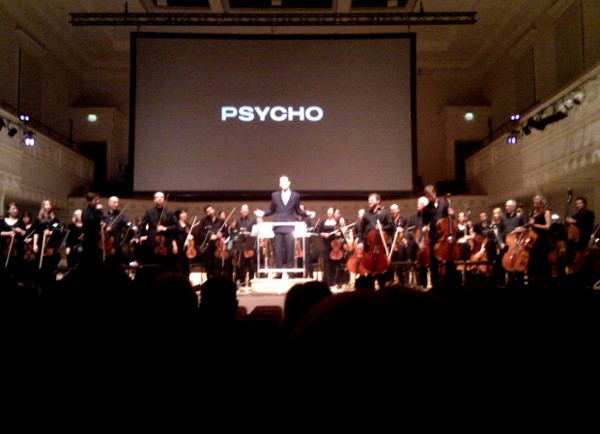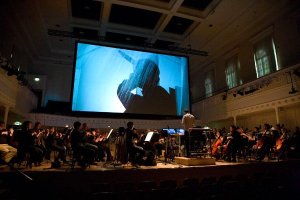 Saturday, 17th September saw the screening of Alfred Hitchcock’s 1960 film Psycho with live accompaniment of Bernard Herrmann’s influential score. Under the guidance of conductor John Wilson and in the red-tinged setting of the Glasgow City Halls, the strings of the BBC Scottish Symphony Orchestra (BBC SSO) earned their crust with a thrilling evening of vintage Herrmann, doing justice to the film composer’s music from the furious main titles’ opening sequence, through to the final low, unresolving dissonance of the final scene. Herrmann gave himself problems when he decided to limit himself to composing a string-only score for Psycho (the score is orchestrated for 50 performers; 14 first violins, 12 second violins, 10 violas, 8 cellos and 6 double basses). He limited himself in the amount of orchestral colouring he could call upon and he also denied himself of a lot of the conventional techniques used by others for films of the same genre as Psycho. But Herrmann’s inventiveness used the strings in ways that had not been considered up to that point. (Note: I don’t have the musical knowledge to enter into a discussion of what and how Herrmann did what he did – there has been volumes written on Herrmann’s score for Psycho. This is really only a comment on my experience of “Psycho: Live”. On the night, with Wilson and the BBC SSO tight, dynamic and animated performance, they highlighted ably how Herrmann was able to provide Hitchcock with a score of top quality.
Saturday, 17th September saw the screening of Alfred Hitchcock’s 1960 film Psycho with live accompaniment of Bernard Herrmann’s influential score. Under the guidance of conductor John Wilson and in the red-tinged setting of the Glasgow City Halls, the strings of the BBC Scottish Symphony Orchestra (BBC SSO) earned their crust with a thrilling evening of vintage Herrmann, doing justice to the film composer’s music from the furious main titles’ opening sequence, through to the final low, unresolving dissonance of the final scene. Herrmann gave himself problems when he decided to limit himself to composing a string-only score for Psycho (the score is orchestrated for 50 performers; 14 first violins, 12 second violins, 10 violas, 8 cellos and 6 double basses). He limited himself in the amount of orchestral colouring he could call upon and he also denied himself of a lot of the conventional techniques used by others for films of the same genre as Psycho. But Herrmann’s inventiveness used the strings in ways that had not been considered up to that point. (Note: I don’t have the musical knowledge to enter into a discussion of what and how Herrmann did what he did – there has been volumes written on Herrmann’s score for Psycho. This is really only a comment on my experience of “Psycho: Live”. On the night, with Wilson and the BBC SSO tight, dynamic and animated performance, they highlighted ably how Herrmann was able to provide Hitchcock with a score of top quality.

Herrmann’s music for the shower scene is an example of a piece of music that has made the leap from the cinematic to the everyday world (who hasn’t used an imaginary knife and mimicked Herrmann’s shrieking string glissandos?) And it seemed that the orchestra knew it was a piece everyone would be expecting and looking forward to because, prior to the piece being performed, the musicians exchanged smiling glances with the conductor as if to say “here we go!” And when the shower scene arrived I have to admit that I watched Herrmann’s music pass between the various sections of the orchestra rather than watch again the scene in the film. Throughout the night it was interesting to see the orchestra performing the music, as this helped to highlight both how the music is passed between the various sections of the strings (e.g., the aforementioned shower scene and the “dialogue” between the bowed and plucked instruments in cues such as “The Package”) and also to show the level of dexterity required by the musicians to play some of the cues. It was particularly enlightening seeing the violins being used like a ukulele for the tremolo passage in “The Stairs”.
Conductor and orchestra highlighted their grasp of Herrmann’s music both in the fast and furious pieces such as the frenetic “The Rainstorm” and “The Murder”, but also in the slower (but just as emotionally charged) tracks. The early scenes of Sam and Marion in the Phoenix hotel room were played with such feeling that the sadness and sense of the inevitable downward spiral of their doomed relationship that Herrmann highlights were beautifully conveyed. The madness of Norman as heard in Herrmann’s dissonant music for the scene where Norman watches Marion through the peephole (as well as the preceding scene in the parlour) was also effectively captured. And the way in which the musicians attacked the sickeningly high register notes in “The Peephole” was something that I hadn’t been aware of until I was actually sat watching it being performed. And finally, the orchestra’s playing of “The Toys” pressed home my feeling that Herrmann’s music in this cue makes the listener/watcher see the toys in his room as a visual history of Norman’s life and we almost feel sorry for Norman because circumstances have led Norman to where he is. All these feelings being suggested through Herrmann’s music and expertly recreated by the orchestra.
One particular highlight was hearing “The Discovery” as the composer intended. Hitchcock decided that the music Herrmann had originally composed for the reveal of Norman as the killer was not what he wanted and insisted that the music Herrmann had composed for the shower scene should be reprised for this scene. Herrmann’s original music was (for the most part) dropped, and the Music from the shower scene was tracked into the final film cut.

I had never before seen a film that was accompanied by the score being played by a live orchestra. Hitchcock’s Psycho seems like an ideal choice to receive this treatment in terms of both the quality of film and music. But with very few loud sound effects in the film (in fact, Herrmann’s music is the sound effects in scenes such as the shower scene) allowed Herrmann’s music to be heard very clearly. At one point in the film (from when Norman watches Marion through the peephole until Norman disposed of the body), there is over 10 minutes where there is a minimum of dialogue and the film is supported only by Herrmann’s music (periods of silence during these scenes are in fact heightened by being bookended by Herrmann’s music). It was good to see the sell-out audience being made up of people with a wide age range, enjoying Herrmann’s whole score to its best advantage (the BBFC “15” age restriction on the film did impose a lower age limit). I do wonder how many people had come to enjoy the specific talents of either Hitchcock, Herrmann or had attended only to see this milestone film on a big screen: I could certainly hear some people gasp at certain scenes suggesting that some in the audience had not seen the film before. John Wilson and the BBC Scottish Symphony Orchestra were, in my opinion, flawless in their execution of Herrmann’s landmark score. It was a night to remember for a very long time to come and, as a firm Bernard Herrmann fan, I thank them for helping me appreciate Herrmann’s work even more.
A great summing up of a great evening. The BBCSSO did a fantastic job.